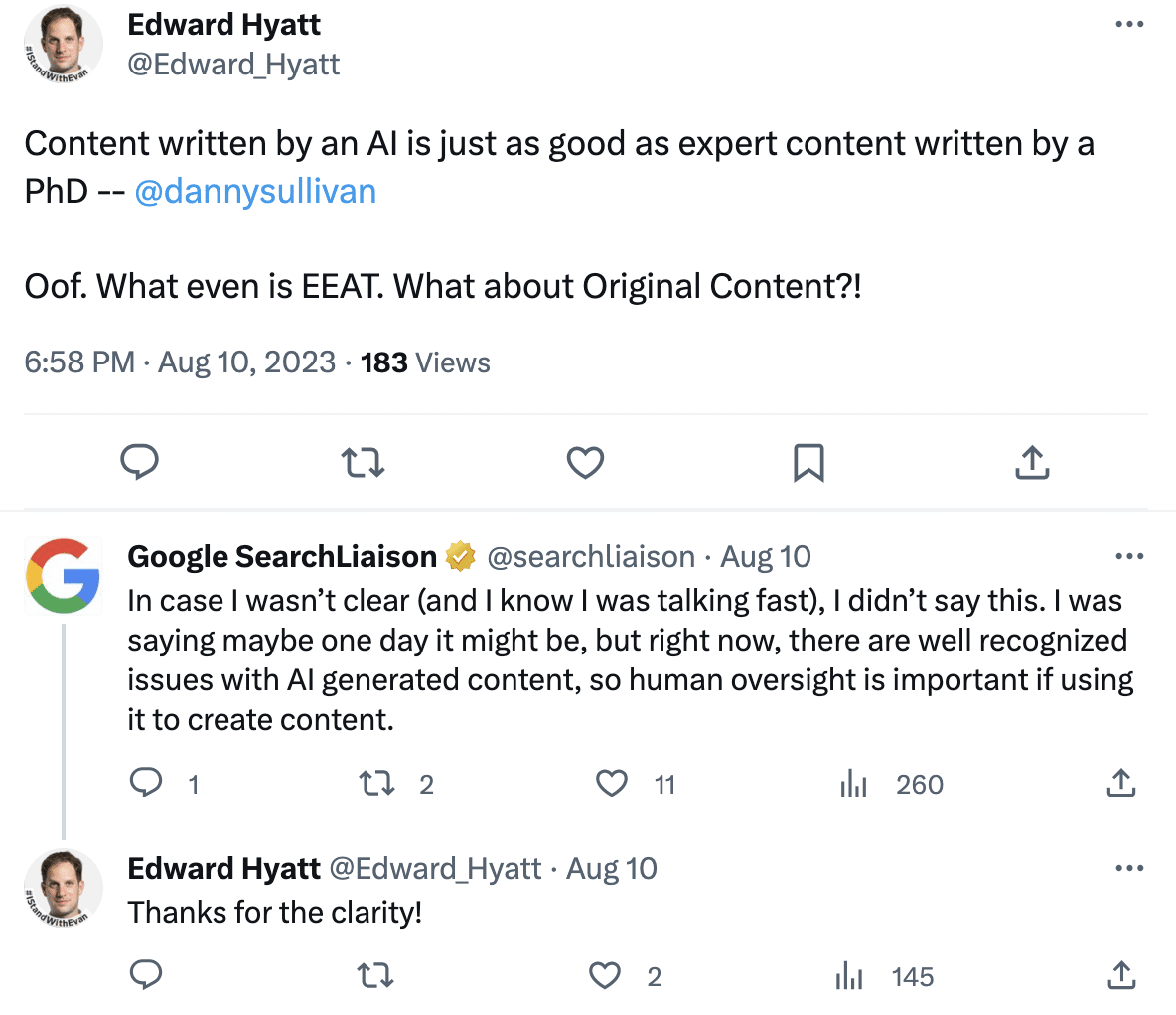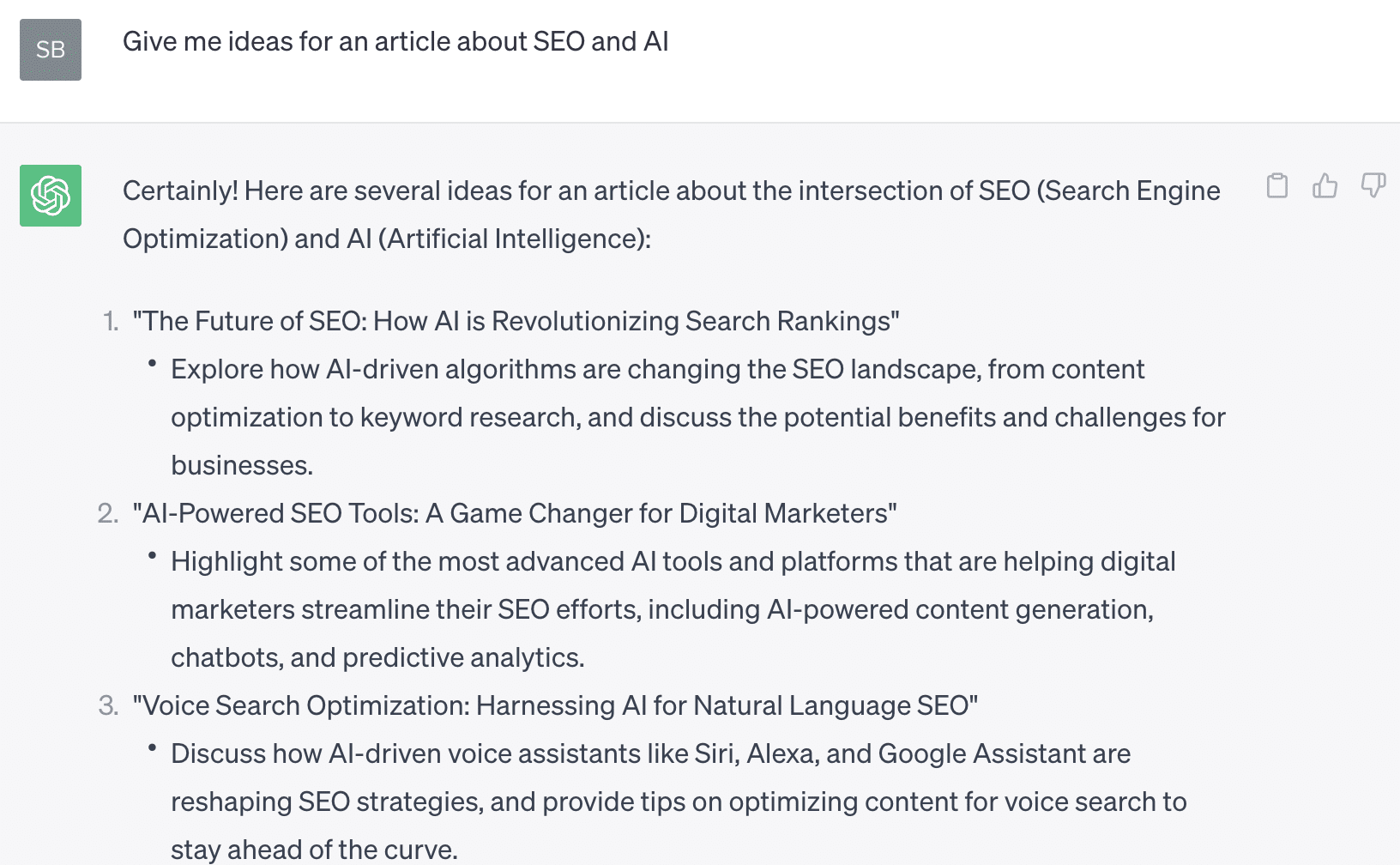Whether we know it or not, we’re caught in a paradox.
There is an industry-wide obsession among SEOs with scalability. More specifically, how we can use generative AI to help with scalability.
With unprecedented advancements in AI as of late, it’s no surprise.
On the one hand, efficiencies of scale are amazing and AI can help craft more content to grow organic visibility and rankings. On the other, over-indexing on content scalability and automation via AI can lead to major problems.
This explosion of generative AI is only fueling the fire of the misguided notion that “more is more” in marketing.
SEOs are debating the value and efficiency of AI-generated content, and deciding how to use it at scale as part of their SEO strategy.
There have been countless articles covering how to scale SEO content quickly with AI… or how to scale without using AI at all. There have also been an equal number of rebuttals from experts ready to tell you how to scale your SEO content strategy with AI, but responsibly and the right way.
For many of us, it’s difficult to know what’s right.
At the same time, Google’s Search Liaison, Danny Sullivan, feels the need to remind us that “…there are well-recognized issues with AI-generated content, so human oversight is important if using it to create content.”

This leaves many of us wondering, “What does it mean for SEO to be scalable today without just adding more pages to your site as fast as you can?”
The pitch for AI
AI-powered content generation tools like ChatGPT, Bard, Copy.ai, and others are potentially transformative for SEOs.
These tools use natural language processing, artificial intelligence, and machine learning to generate quality content on any range of topics.
You can ask ChatGPT just about anything.
Generative AI can save countless hours by automating and streamlining content creation, and ultimately help marketers achieve amazing results.

Important note: Although tempting, this article was 100% written by a human!
There should always be human oversight to review and copy edit any AI-generated content.
As always, Google’s goal is relevance and quality. These same benchmarks determine how well AI-generated content will perform in search results.
As such, rigorous quality control is critical, but the benefits are clear.
The problem of more
The potential for AI tools to be integrated within SEO is intriguing. But creating content just for the sake of more content is unlikely to improve your site’s organic visibility in the long term.
We all know poor-quality content can do more harm than good in the eyes of search engines and there are still so many unknowns surrounding content created by AI.
The ethical and legal ambiguities coupled with the capabilities of generative AI make it all too easy for bad actors to take advantage of the tech.
So, what are the implications of generative AI on SEO? What are the inherent risks we need to weigh against any potential value?
- Rankings: It is yet to be determined how good Google and Bing are at deciphering human- vs. AI-created content. How well does AI-generated content rank in the search engines?
- Penalties: What if Google eventually begins to penalize AI-generated content?
- Copyright: If you post content created by ChatGPT or Bard or some other tool, do you own the copyright? Or are you opening yourself up to potential disputes?
- Duplicate content: Popular generative AI tools may not give the exact same answer to everyone who asks the exact same question, but we don’t know exactly how similar the answers are. Could they be similar enough to be considered duplicate content by search engines?
- Accuracy: The accuracy and reliability of ChatGPT has been heavily monitored and a number of studies claim that accuracy has gotten worse over time.
- Value: Most importantly, if you are one of many using the same AI tools to create automatically generated content, how is that delivering unique value to your audience? And isn’t that what SEO is all about?
What is scale in SEO?
Don’t get me wrong, OpenAI has a wide range of use cases for generative AI via plugins that can be beneficial for SEOs:
- Keyword Explorer for keyword research.
- Now for Google Trends data.
- SEO for on-page analysis.
There are even plugins to create audio transcriptions and edit images.

However (and this is important):
- Content replication is not scaling SEO.
- Running a data collection tool that delivers reports is not scaling SEO.
So what is?
At the most basic level, scalability in SEO is about pattern recognition. It is identifying patterns to build a data-driven and creative process for repeatable optimization efforts.
Notice that speed is not part of the equation.
Efficiency is certainly a goal, but the two are not binary. It is possible to scale without speed.
Tthe key to scaling SEO is defining a process that follows best practices and leads to a great user experience.
The challenge is in overcoming a potential sacrifice in quality, whether that’s with content, links, or site structure.
You have to maintain a clear vision of the goal of SEO – providing value to your audience – while adapting to growth.
Scalability vs. efficiency
Without a doubt, AI is making its mark on every aspect of the marketing industry.
The tech is powerful and exciting. Finding ways to integrate it into workflows can be rewarding. Many useful plugins can support SEO and content marketing beyond just content production.
However, building a strategy around using ChatGPT to produce a high volume of content for the sake of content is not going to serve you long-term.
At this stage, the technology still has a long way to go and needs meticulous oversight.
Scalability in SEO has to look beyond just efficiency; beyond adding more content to your site as fast as you can.
Scalable SEO is about striking a balance between growth and optimization with the right process. It’s about:
- Ensuring user experience continues to exceed expectations.
- Developing strategies that can be efficiently applied at scale without sacrificing quality.
AI alone is not there. Not yet.
Opinions expressed in this article are those of the guest author and not necessarily Search Engine Land. Staff authors are listed here.
Related stories
New on Search Engine Land
https://searchengineland.com/seo-scalability-problem-431923


